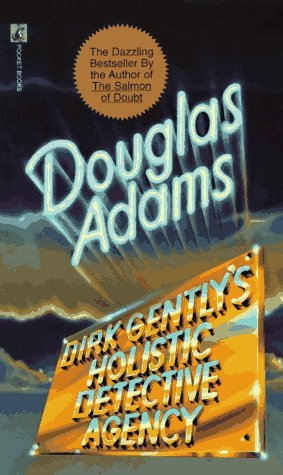Dirk Gently's Holistic Detective Agency

ISBN:978-1476782997
Adams still can’t stay away from plotlines that parallel the Bible in one way or another in this former-Dr.-Who-script-turned-into-a-book. Of course, where they do parallel Biblical narratives, the Biblical stories are treated routinely as deserving of scorn. This proves annoying. However, once one gets beyond the annoyance of “Boy, the Bible sure is dumb!”, this book tells a story that stands up to the test of time better than The Hitchhiker’s Guide to the Galaxy.
It stands to reason that since this book was written well after The Guide that there was time for Adams to mature as a writer. In this book, he tackles matters that are not, as a matter of fact, rational. Ghosts are here. Ideas concerning parts being connected to the whole are here. Even Quantum Physics makes some appearances. The point of the book appears to be that nothing much rational is present and so one must begin to lean on those things which are not inherently rational to understand and solve the highly irrational cases that the protagonist, Dirk Gently, solves.
Possession and hypnotism play major roles in the story, although the way by which they do is not beyond the believability of how such mechanisms might work. The discussion of fractal music appears here too, which was well ahead of the curve. The technological acumen of Adams is distinct and in-depth in the work which makes sense as he would have been moving in the kinds of crowds positioned at the technological forefronts. It is somewhat amusing, though, to note that aliens and ghosts appear to be, at least in the written style of Adams, more rational and less subject to scorn than Biblical stories like Revelation.
The plot device of the Electric Monk whose entire job is to believe whatever is put in front of him and finds a door called “The Way” is, it seems, supposed to be a poke at those who maintain faith. The caricature is that they are an unthinking lot who never have to concern themselves with either consequence or logic. Indeed, this is mitigated one supposes somewhat by the idea that the monk was created to be this way, and so Adams gets some distance on the subject instead of stating “religion is dumb and especially monks are dumb” in a glaring way.
A time machine that concerns a pot made in Greece at an earlier date and a salt shaker which finds itself embedded in the pot in an impossible way also make appearances, which has a distinctly “last supper somebody needs to fix some mistake they made” sci-fi twist. The reader again discovers that the time machine is still a better bet in that it is not ridiculed as much as all the other bits and pieces which are written to be interpreted as religious nonsense.
The other troubling concern in the book is the fixation on pizza. The meal features in the plotline oddly and unnecessarily. One wonders if Adams was not trying to signal something with all the anti-religion pro-pizza rhetoric. The reliance on the poem Kubla Kahn is also telling. Certainly the allusion is clever as it was written allegedly during an opium high or shortly after one and was interrupted which features as a later plot device via the aforementioned time travel. There are also heavy doses of murder present in the plot which stands to reason as it is, after all, a detective novel.
Yet, despite all these things, the plot is well-executed, and one is forced to wonder about certain questions concerning humanity and where it features. Maybe Adams was a kind of “elite” of his time and it serves as a snapshot of where a lot of Sci-Fi writers who got their start in the 70’s began to tarry. Certainly, he died early, unexpectedly, and tragically just after having an asteroid named after a main character from his previous work. If the fruit for being a famous author that scorned religion was to die early due to high blood pressure and heart problems, maybe there are additional layers of cautionary tales this work presents. While Gordon Way frets about his last words appearing on an answering machine seem to come true in the sense that they are his last words to appear on an answering machine, eventually the British Telecom people fix the phone for Professor Chronotis which breaks his time machine. Adams would die a short six years later, from a heart attack resting after his workout after his Doctor warned him about having high blood pressure. Three months later, September 11th would take place. Sometimes, one supposes the end is closer than we might like to believe. For Adams, he really did not want to believe at all and yet, there the end was anyway. Dirk Gently then might just be the author grappling with what he cannot explain against the madness of the end of the 20th century. If for no other reason, the work shines for this.
